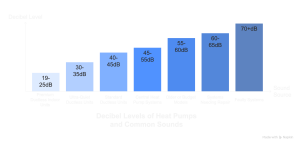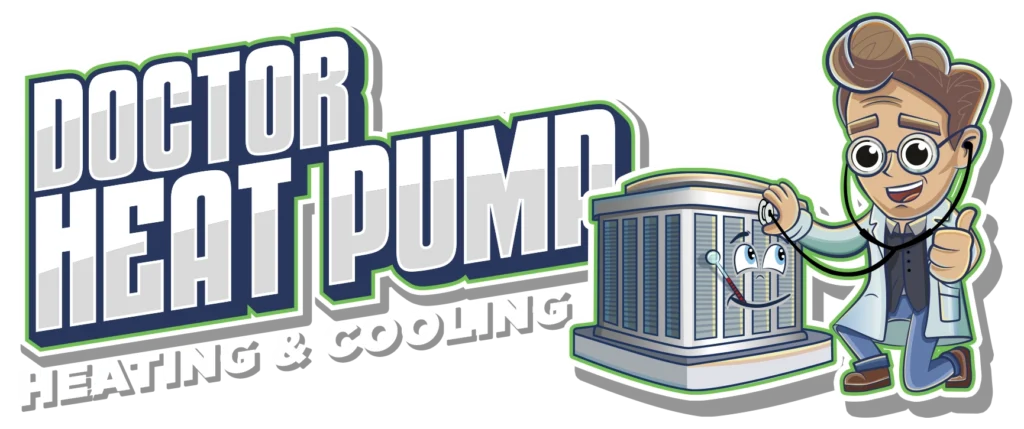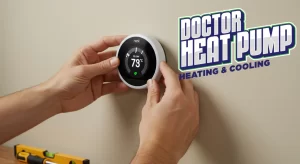Are you wondering if your heat pump noise is normal? Many Las Vegas homeowners and business owners ask this same question. Whether you live in a high-rise condo or a family home, understanding what sounds are okay can give you peace of mind. Additionally, if you’re shopping for a new system, knowing which brands run quieter can help you make the best choice for your space. At Doctor Heat Pump, we help Las Vegas families understand their HVAC systems and find the perfect solutions for their comfort needs.
Heat pumps naturally make some noise while they work. However, the amount of noise varies greatly between different models and brands. In this guide, we’ll explore normal noise levels, compare top brands, and help you find the quietest option for your Las Vegas home or business.
Understanding Heat Pump Noise Basics
Before diving into brand comparisons, let’s first understand what causes heat pump noise. Most sounds come from three main parts:
- Compressor: The heart of your system that pressurizes refrigerant
- Fan motors: Move air across the coils inside and outside
- Refrigerant flow: The liquid moving through pipes and coils
Normal Noise Levels
Most heat pumps operate between 40-60 decibels (dB). To put this in perspective, here are common sounds and their decibel levels:

| Sound Level | Heat Pump Type | Real-World Comparison |
|---|---|---|
| 19-25 dB | Premium ductless indoor units | Whisper, rustling leaves |
| 30-35 dB | Ultra-quiet ductless units | Quiet library, soft whisper |
| 40-45 dB | Standard ductless units | Quiet office, refrigerator hum |
| 45-55 dB | Central heat pump systems | Normal conversation, moderate rainfall |
| 55-60 dB | Older or budget models | Background music, dishwasher |
| 60-65 dB | Systems needing repair | Busy restaurant, normal TV volume |
| 70+ dB | Faulty systems | Vacuum cleaner, city traffic |
Furthermore, heat pump noise levels change with the seasons. During Las Vegas summers, your system works harder and may sound louder. Similarly, winter operation can create different sounds as the system switches to heating mode.
Factors That Affect Heat Pump Noise Levels
Several factors influence how loud your heat pump operates. Understanding these can help you choose a quieter system or reduce noise from your current one.
System Type and Design
Ductless mini-split systems typically run much quieter than central ducted units. Moreover, the indoor units of ductless systems often operate at whisper-quiet levels of 19-40 dB (equivalent to leaves rustling or a quiet library). On the other hand, central systems must move air through ductwork, which naturally creates more noise.
Installation Quality
Proper installation plays a huge role in heat pump noise control. Key installation factors include:
- Vibration isolation pads: Prevent system vibrations from transferring to your building
- Proper mounting: Secure installation reduces rattling and movement
- Strategic placement: Distance from bedrooms and quiet areas matters
- Level installation: Unlevel units create unnecessary noise and wear
Age and Maintenance
As heat pumps age, they naturally become louder. Consequently, regular maintenance helps keep noise levels down by:
- Cleaning coils and filters
- Lubricating moving parts
- Tightening loose components
- Replacing worn parts before they fail
For more details on maintenance, check out How Often Does a Air Heat Pump Need Maintenance? Vegas Guide.
Heat Pump Noise Comparison by System Type
Different types of heat pumps produce varying noise levels. Let’s examine each type to help you understand what to expect.
Central Ducted Heat Pumps
Central systems typically produce 45-60 dB of heat pump noise (similar to normal conversation or moderate rainfall). These systems have both indoor and outdoor components that contribute to overall sound levels.
Pros:
- Whole-home comfort
- Hidden indoor components
- Familiar technology
Cons:
- Generally louder operation
- Ductwork can amplify sounds
- Less control over individual room comfort
Ductless Mini-Split Systems
Ductless systems offer the quietest operation for most Las Vegas homes and businesses. Indoor units often run at just 19-35 dB (quieter than a whisper), while outdoor units typically operate at 40-50 dB (similar to a quiet office environment).
Benefits for Las Vegas residents:
- Ultra-quiet indoor operation
- No ductwork noise
- Individual room control
- Perfect for high-rise living
Check out this post for more information: Mini Split Heat Pump: What It Is and How It Works
Geothermal Heat Pumps
Although less common in Las Vegas, geothermal systems provide the quietest operation overall. Since the main components are underground, heat pump noise is minimal, typically operating at 25-40 dB (equivalent to a quiet library).
Learn more about geothermal or ground source heat pumps here: How Does a Ground Source Heat Pump Work? A Guide for Vegas Homeowners
Brand-by-Brand Noise Level Analysis
Now let’s compare specific brands and their noise performance. This information will help you choose the best system for your Las Vegas property.
Premium Quiet Brands
Mitsubishi Electric
Mitsubishi leads the industry in quiet operation. Their top models feature:
| Model Series | Indoor Noise | Outdoor Noise | Real-World Comparison | Best For |
|---|---|---|---|---|
| MSZ-FH Series | 19 dB | 44 dB | Whisper / Quiet office | Bedrooms, offices |
| MSZ-GL Series | 22 dB | 46 dB | Rustling leaves / Moderate rain | Living areas |
| PUZ-HA Series | 25 dB | 48 dB | Quiet library / Normal conversation | Multi-zone systems |
Daikin
Daikin systems use advanced sound dampening technology. Furthermore, their inverter technology reduces heat pump noise by running at variable speeds instead of constantly turning on and off.
Key quiet features:
- Sound blankets around compressors
- Variable-speed operation
- Advanced fan blade design
- Vibration-reducing mounts
Carrier Infinity Series
Carrier’s premium line offers excellent noise control for central systems. Additionally, their Greenspeed technology provides quiet operation even during Las Vegas’s hottest days, typically operating at 50-55 dB (similar to moderate rainfall or background music).
Mid-Range Options – Featuring Our Top Pick
Lennox: Doctor Heat Pump’s Preferred Brand
At Doctor Heat Pump, Lennox is our top choice for overall quality, performance, and efficiency. Moreover, Lennox systems provide excellent heat pump noise control in their mid-range and premium lines.
Why we recommend Lennox:
- Superior dual-fuel heat pump technology
- Excellent build quality and longevity
- Advanced sound dampening features
- Optimal performance in Las Vegas climate
- Typically operate at 48-55 dB (similar to normal conversation)
Learn more about why Lennox is our preferred brand for Las Vegas homes.
Trane XV Series
Trane systems balance performance with reasonable heat pump noise levels. Their XV20i model operates as low as 55 dB (equivalent to background music), making it suitable for most residential applications.
Rheem Prestige Series
Rheem provides good value with acceptable noise levels. Moreover, their EcoNet technology allows for quieter operation during night hours, typically running at 52-58 dB (similar to a dishwasher or moderate conversation).
Budget-Friendly Choices
Goodman
While not the quietest option, Goodman systems offer reliable performance at affordable prices. However, expect heat pump noise levels in the 55-65 dB range (equivalent to busy restaurant or normal TV volume).
American Standard
American Standard provides entry-level quiet features at competitive prices. Nevertheless, their systems typically operate at 58-62 dB (similar to normal TV volume or busy office), which is louder than premium brands.
How to Choose the Quietest Heat Pump for Your Las Vegas Home
Selecting the right system depends on your specific needs and situation. Consider these factors when making your decision:
Evaluate Your Environment
For high-rise living:
- Ductless systems work best (19-35 dB indoors – quieter than a whisper)
- Consider neighbor proximity
- Check building noise restrictions
For single-family homes:
- More flexibility in placement
- Consider bedroom locations (aim for under 45 dB – quiet office level)
- Think about outdoor entertaining areas
Read Specifications Carefully
When comparing systems, look for:
- Sound ratings in dB (lower numbers mean quieter operation)
- Indoor vs. outdoor measurements
- Testing conditions (many manufacturers test under ideal conditions)
- Variable speed capabilities (typically 3-5 dB quieter than single-speed)
Questions for Your HVAC Contractor
Ask these important questions to ensure you get accurate information about heat pump noise:
- What are the actual noise levels for this specific model?
- How will installation location affect noise?
- What sound dampening options are available?
- Can you provide references from similar installations?
For professional installation advice, visit our Heat Pump Installation page and the following resources:
- Heat Pump Install: Costs, Benefits & What to Expect
- What Size Heat Pump Do I Need for My Las Vegas Home? Doctor Heat Pump Explains
- Unlocking Savings: Guide on Receiving Tax Credit for Heat Pump
Reducing Heat Pump Noise from Your Current System
If you already have a heat pump that’s too loud, several solutions can help reduce heat pump noise without replacing the entire system.
Professional Maintenance Solutions
Regular maintenance significantly impacts noise levels. Therefore, schedule annual tune-ups that include:
- Cleaning coils: Dirty coils force the system to work harder
- Checking refrigerant levels: Low refrigerant causes excessive noise
- Tightening connections: Loose parts create rattling sounds
- Lubricating motors: Proper lubrication reduces friction noise
Sound Barriers and Landscaping
Strategic placement of barriers can help reduce heat pump noise for your neighbors and family. Furthermore, these solutions can lower perceived noise by 5-10 dB:
Natural sound barriers:
- Dense shrubs around outdoor units
- Wooden privacy fences
- Sound-absorbing plants
Artificial barriers:
- Acoustic fencing panels
- Sound deflection screens
- Decorative sound walls
Vibration Dampening Techniques
Installing vibration pads or mounts can dramatically reduce heat pump noise transmission. Additionally, ensuring your unit sits level prevents unnecessary vibrations that amplify sound.
Installation Tips for Minimal Heat Pump Noise
Proper installation is crucial for quiet operation. Here’s what Las Vegas homeowners should know:
Strategic Placement
Avoid these locations:
- Directly under bedroom windows (can increase perceived noise by 10+ dB)
- Near property lines (check local codes)
- In corners where sound can echo
- On upper floors without proper isolation
Better placement options:
- Side yards with adequate clearance
- Areas with natural sound buffers
- Ground-level installations when possible
Learn more about proper placement in our guide on where not to install a heat pump in Vegas.
Professional Installation Importance
DIY installation often leads to increased heat pump noise due to improper mounting, inadequate vibration isolation, and poor placement decisions. Consequently, professional installation ensures optimal performance and minimal noise.
At Doctor Heat Pump, we specialize in quiet installations for Las Vegas homes and businesses. Our experienced technicians understand local building codes and noise ordinances.
When Heat Pump Noise Indicates Problems
While some noise is normal, certain sounds signal potential issues that need immediate attention:
Warning Signs
Call for service if you hear:
- Grinding or metal-on-metal sounds (70+ dB – vacuum cleaner level)
- Loud banging or clanking (75+ dB – garbage disposal level)
- Continuous squealing (65+ dB – hair dryer level)
- Unusual vibrations
Seasonal noise changes:
- Much louder operation in summer
- Strange sounds during defrost cycles
- Increased noise after storms or high winds
Emergency Situations
Some heat pump noise issues require immediate attention:
- Electrical arcing sounds
- Hissing from refrigerant leaks
- Loud grinding that gets progressively worse
For emergency repairs, contact our heating repair services.
Conclusion and Next Steps
Understanding heat pump noise levels helps you make informed decisions about your Las Vegas home or business comfort system. Premium brands like Mitsubishi and Daikin offer the quietest operation, while our preferred brand, Lennox, provides excellent value with superior performance and reasonable noise levels.
Remember that proper installation and regular maintenance significantly impact how loud your system operates. Whether you’re shopping for a new system or trying to reduce noise from your current heat pump, professional guidance ensures the best results.
Ready to find the perfect quiet heat pump noise solution for your Las Vegas property? Contact Doctor Heat Pump today at +1 (702) 467-7236 for a free consultation and noise assessment. Our experienced team will help you choose the right system and ensure proper installation for years of quiet, comfortable operation.
Frequently Asked Questions
Q: What’s considered normal heat pump noise? A: Normal operation ranges from 40-60 dB, similar to a quiet conversation (45 dB) or moderate rainfall (50 dB).
Q: Why is my heat pump louder in winter? A: Winter operation requires defrost cycles and harder work to extract heat from cold air, naturally increasing noise levels by 5-10 dB.
Q: Can I make my existing heat pump quieter? A: Yes, through professional maintenance, sound barriers (can reduce 5-10 dB), vibration dampening, and strategic landscaping.
Q: Do more expensive heat pumps run quieter? A: Generally yes, premium models invest in sound dampening technology and variable-speed operation that reduces heat pump noise by 3-8 dB compared to budget models.
References
- Air Conditioning, Heating, and Refrigeration Institute (AHRI) – Industry standards for HVAC noise ratings
- U.S. Department of Energy – Heat pump efficiency and operation information
- Environmental Protection Agency – Indoor air quality and HVAC system guidelines
- American Society of Heating, Refrigerating and Air-Conditioning Engineers (ASHRAE) – Technical standards for HVAC systems
- National Institute for Occupational Safety and Health (NIOSH) – Decibel level references and hearing protection guidelines






